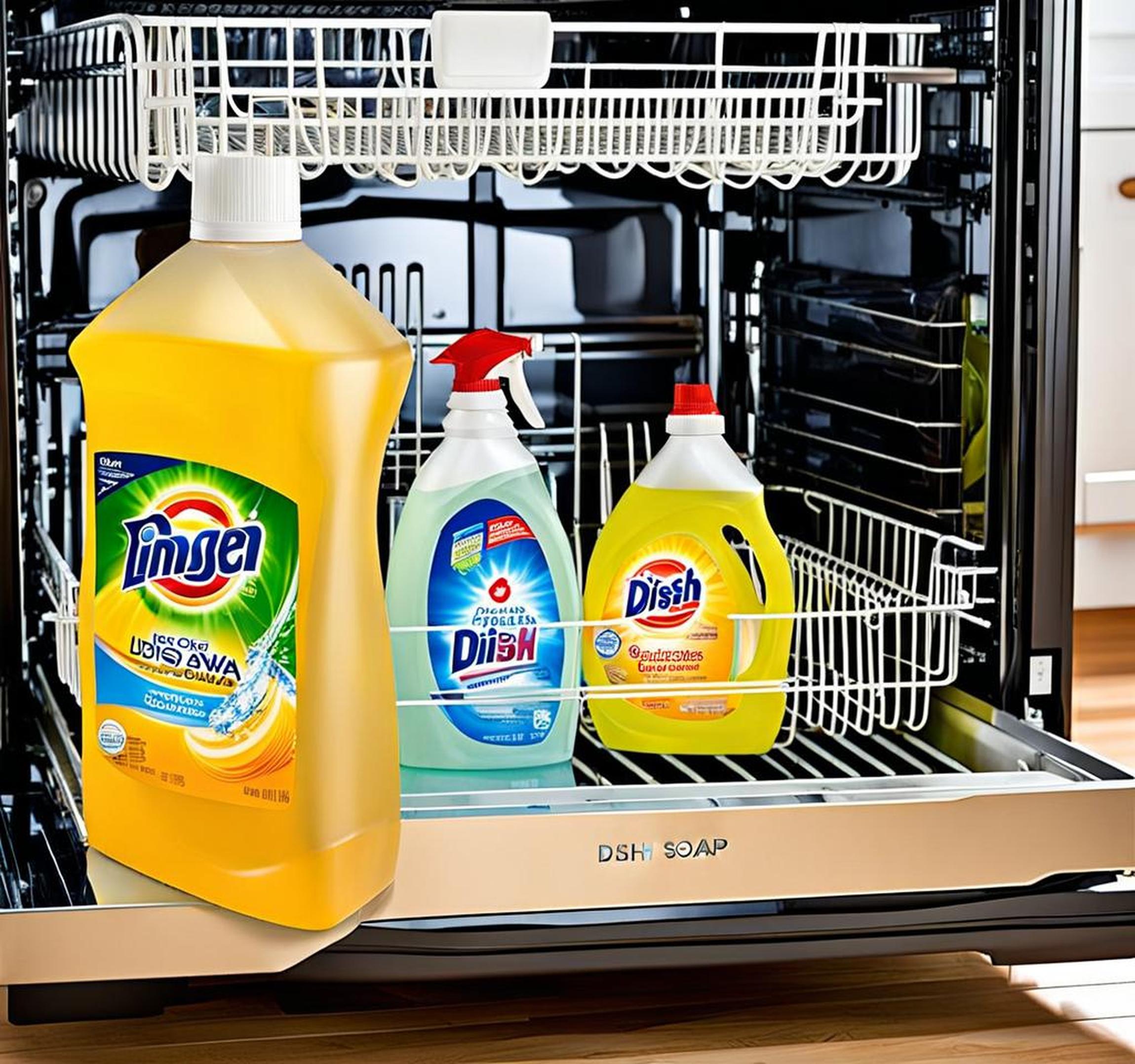Using the wrong type of soap in your dishwasher can create major issues. If you’ve ever wondered whether liquid dish soap can be substituted for dishwasher detergent, read on to learn why this common swap causes chaos.
We’ll explain the science behind how dish soaps and detergents work differently, detail the messy problems caused by mixing them, and share tips for fixing your dishwasher if you make this mistake.

What is Dishwasher Detergent and How Does it Differ from Dish Soap?
Dishwasher detergents are specially formulated for use in dishwashers. They contain enzymes that help break down and dissolve food residues. The chemicals in detergents are designed to clean dishes without producing loads of suds that can overflow the dishwasher.
Dish soaps, on the other hand, are meant for hand washing dishes in the sink. They make plenty of suds to help remove grease and give that “squeaky clean” feeling. But all those extra bubbles cause issues inside a dishwasher.
Dish Soap Reacts with Water to Produce Suds
When dish soap mixes with the water in your dishwasher, it reacts by creating copious amounts of thick bubbles and suds. This is the same frothy reaction that happens when you swirl dish soap in your sink.
However, dishwashers aren’t designed to contain loads of suds. The bubble buildup has nowhere to go, rapidly filling the interior.
Overflowing Suds Can Leak Onto Floor
As suds continue forming, your dishwasher can overflow with bubbles. Excess foam then leaks out onto your kitchen floor creating a slippery, soapy mess.
Water damage to flooring or cabinets is possible if the leak isn’t caught early. And puddles of dish soap can be a fall hazard if someone steps on the slick suds.
Soap Residues Coat Dishes after Cycle Finishes
Using dish soap doesn’t just create external chaos; it leaves interior problems too. With too many bubbles, your dishes won’t get properly cleaned even after a full wash cycle.
An abundance of suds actually decreases cleaning performance. All the extra foam prevents water jets from reaching dish surfaces to wash away food.
This leaves a cloudy film of soap residue stuck to glassware, plates, and utensils. You’ll likely have to rewash items by hand to rinse off the stickiness.
Signs You Accidentally Used Dish Soap
How can you tell if too many suds mean there’s dish soap in your dishwasher? Here are a few telltale signs to check for:
- Puddles of suds around the dishwasher
- Leftover cloudy film on dishes after a cycle
- Bubbles overflowing out of the dishwasher
- Dishes feel slippery or soapy despite washing
How to Fix Your Dishwasher After Using Dish Soap
Don’t panic if you notice an overflow of bubbles signaling dish soap got added. Here are some tips to get your dishwasher functioning again:
Immediately Turn Off Dishwasher to Stop More Suds
As soon as you see suds or water leaking from your dishwasher, press the power button to turn it off. This will stop more foam from accumulating.
Wipe Up Any Leaked Suds Puddles on Floor
Grab some paper towels or a mop to soak up any spilled bubble solution from around and under your dishwasher.
Run Vinegar Cycle to Remove Soap Residue
Pour 2 cups of white vinegar into your empty dishwasher. Run a short cycle to cleanse away any caked-on detergent.
The vinegar dissolves soap scum and leaves dishes sparkling again. Just don’t add more dish soap when rerunning your dirty load.
Use Dishwasher Cleaner if Vinegar Doesn’t Work
For extreme soap buildup clogging your machine, use a dishwasher cleaner product. These formulations clear soap deposits from internal components.
Safe Cleaning Alternatives for Dishwashers
Want an effective cleaner but unsure which products are dishwasher safe? Here are some non-soapy options:
Make Homemade Detergent with Washing Soda
Mix washing soda, baking soda, and borax to create a simple DIY dishwasher detergent. Add lemon juice or salt for extra grease-cutting power.
Use a Small Amount of Soap with Baking Soda
For an occasional gentle wash, try a tablespoon of dish soap combined with baking soda. The soda helps suppress excess suds.
Buy Actual Dishwasher Detergent
When in doubt, use detergents specifically formulated for dishwashers. Many brands offer eco-friendly and budget friendly options.
When to Strictly Avoid Dish Soap in Dishwashers
Are there any times when dish soap works in a dishwasher? Unfortunately, the answer is no. Here are some times to absolutely keep them separated:
- Regular wash cycles: The suds will be uncontrollable.
- Heavily soiled pots and pans: Dish soap won’t cut through tough grease.
- Delicate dishware: Bubbles could damage fragile items.
Hopefully we’ve made it clear why dish soap causes disasters when added to dishwashers. Here are some key tips to remember:
- Only use detergent made for dishwashers.
- Address any sudsy overflows right away.
- Stick to handwashing dishes with dish soap.
Understanding the science behind surfactants and suds helps explain why these two products don’t mix. Now that you know the problems caused by dish soaps, you can avoid bubble catastrophes.
